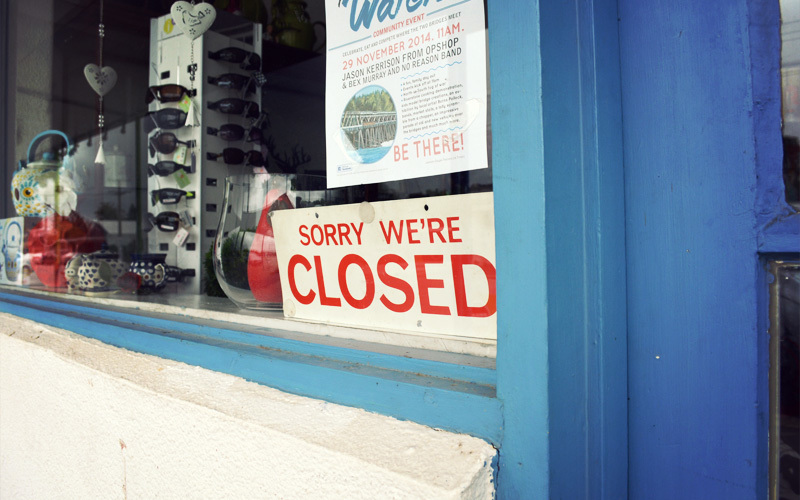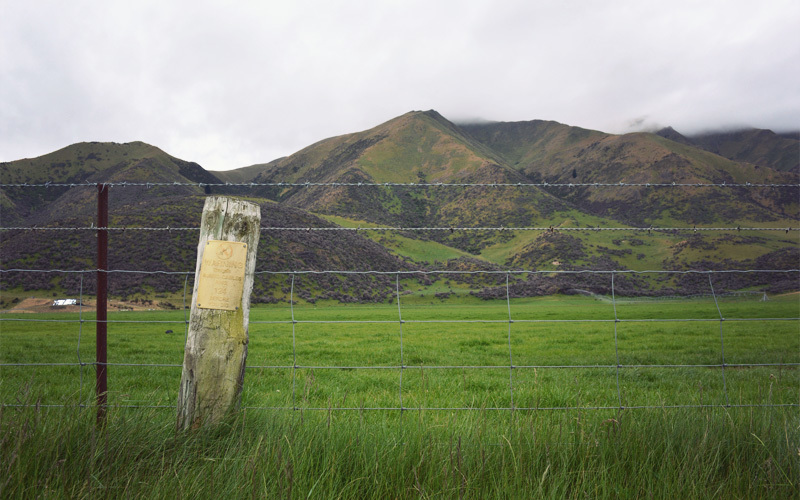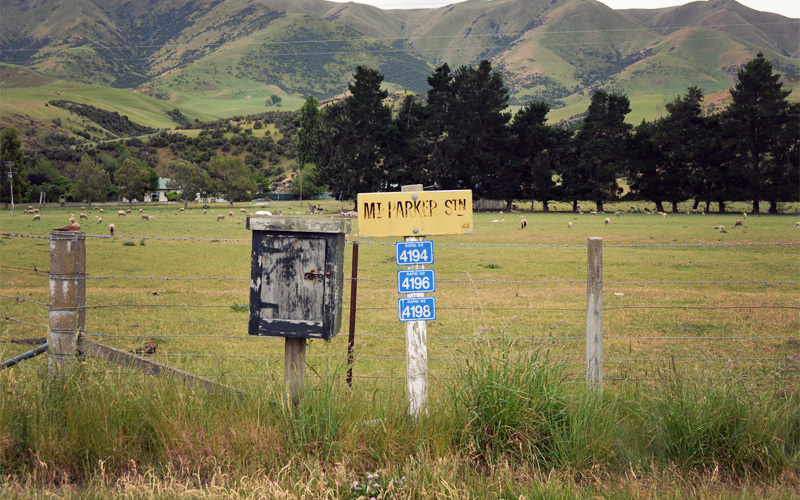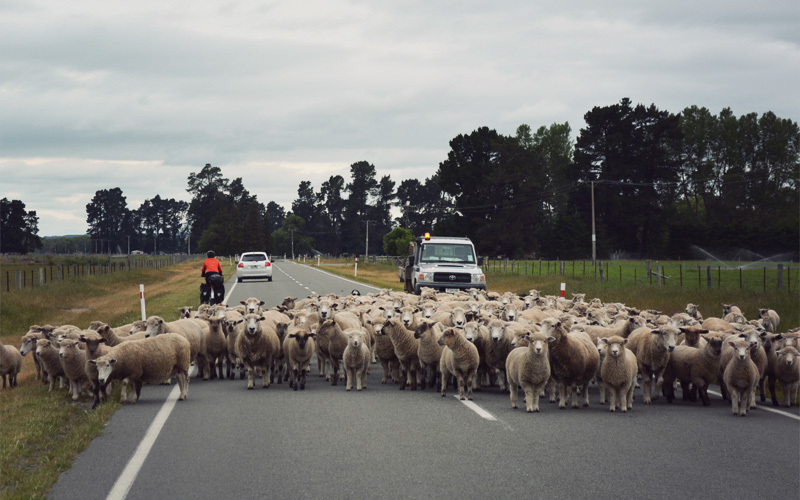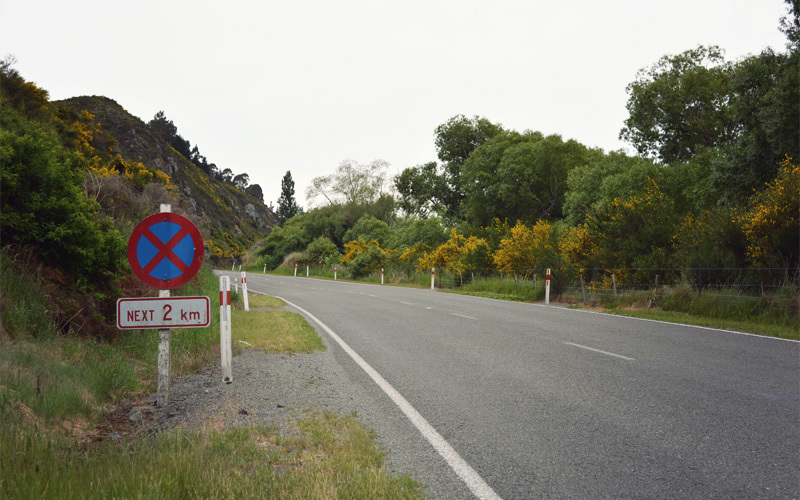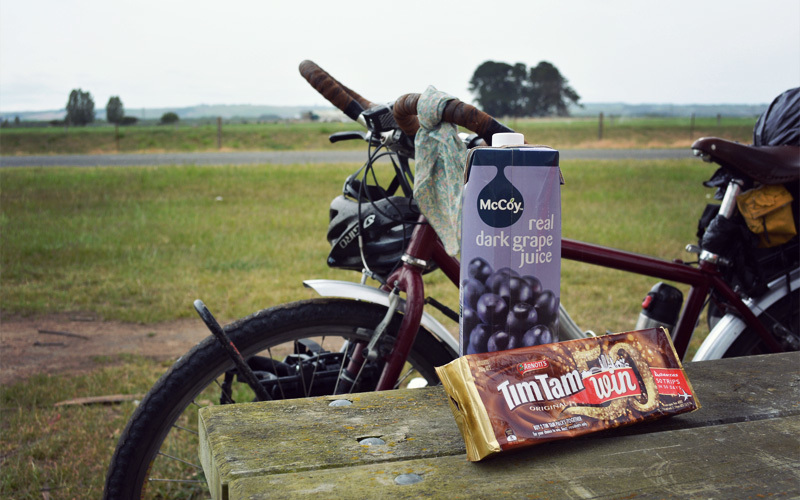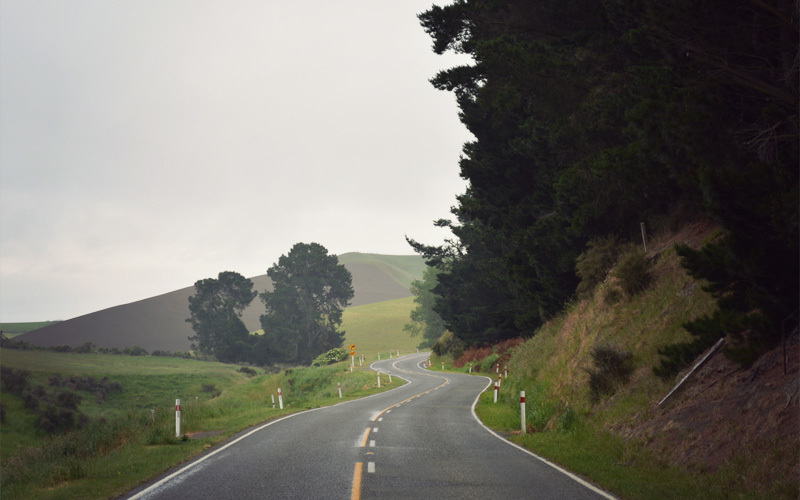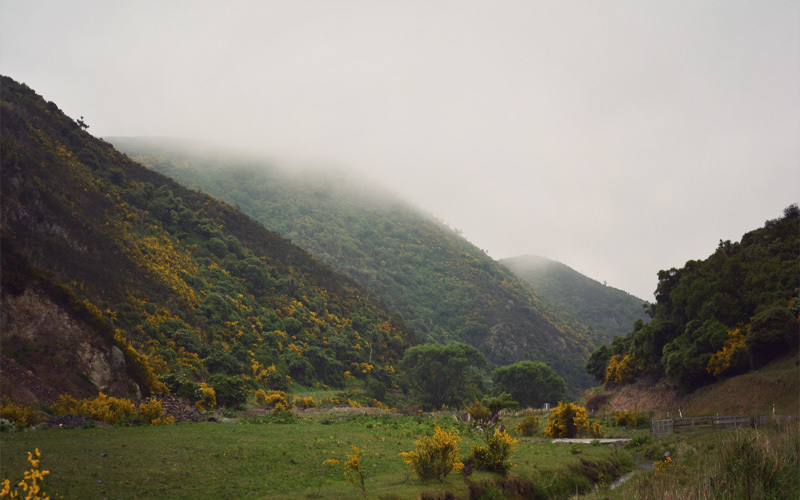November 25, 2014
Day 91: Kurow, NZ to Waimate, NZ
Before heading out of town we stop by a cafe, pick up a collection of warm pies, and sit at a table on the sidewalk out front while we eat them. As much as any one place could represent the small farming towns of New Zealand, Kurow is it. It's a place where farmers with broad shoulders and callused hands walk around in dirty old rugby jerseys with shorts, wool socks, and muddy gum boots; where huge tractors pulling farm implements behind them roll down the main street, park next to the bar, and sit for the next ten minutes with engines idling; where the people who work behind the counter of the takeaways know everybody who walks in the door except for us; and where the most important things worth talking about if you live here are what the weather did yesterday and what it's going to do in the next few days.

| Heart | 1 | Comment | 0 | Link |
Just like so many towns we've passed through, there's one motel as the highway leads into Kurow and another as it heads away. There's one bar, one Foursquare-brand grocery store, a volunteer fire department, a gas station that also sells tires and does car repair, and a holiday park where every building could use a fresh coat of paint. Like these other towns, there's a vet's office, a real estate broker, a farm supply store, a few dusty and closed-up storefronts, and a handful of little shops that sell things like ugly scarves and fake flowers and enamel tea kettles painted to look like owls and that, despite selling exactly these things and opening for business only in the afternoon for five days each week, somehow manage to keep going.
Most everyone we see asks how we're doing, where we're going, or remarks how it's a great day for a push bike ride. (Everyone who mentions the bikes calls them push bikes.) It's welcoming and uplifting, the opposite of what we so often felt in the tourist-centered places that we couldn't avoid. If I lived in a small town I imagine I'd reach a point where it felt too comfortable or too predictable, and then I'd have to pack up everything I own and go off and do something impulsive and ridiculous like spending a few years riding all over the world on a bicycle. But as a traveler passing through, where I experience these places only for an hour or a day at a time, they remain unique and charming and good for the soul when I'm far away from the comfort of home. I hope that never changes.
At the edge of town we cross over the Waitaki River and then turn right, which takes us south along the opposite side of the valley up which we rode yesterday afternoon. The heavy hand of irrigation is everywhere, with sprinklers and water wheels and pumping stations set among the deep green of the fields, culverts crossing beneath the road, and pipes running from roof gutters into giant plastic collection tanks. Flanking the cows and sheep and empty paddocks are the hand-cut wooden fence posts, weathered mailboxes, plastic-wrapped hay bales, and sagging barns that seem to exist in any rural area, whether you're in New Zealand or Nova Scotia or Nebraska.
Halfway through our run down the valley a white hatchback Toyota passes us. It continues on for another quarter of a mile, but then it stops in the middle of the left-hand lane, where the driver rolls down her window and starts to chat with a farmer riding in the grass along the edge of the road on his ATV. Even for a rural highway like this it seems strange to stop in the middle of the road instead of pulling off into the shoulder or a driveway or one of the dozens of gravel entryways that connect the road and the paddocks that parallel it. But as we move closer, we look beyond the car and the ATV, and that's when we notice what's headed our way.
There are sheep, at least a hundred of them, on the highway. And not just the surface of the road, but along the shoulder, in the drainage ditches beyond the shoulder, and all the way to the fence lines on either side. The farmer on the ATV leads the way, while behind him a second farmer drives a flatbed Toyota ute to keep an eye on the chaos that goes on in between them. The guy on the four-wheeler tells Kristen that it's okay to pass through, which she does by following the hatchback. It parts the sea of little white faces and provides a clear and easy path toward the empty highway on the other side.
The wedge disappears by the time I roll up. But the guy in the ute sticks his right arm out the open window and waves me on, so I keep pedaling, until the sheep are close enough that I'm surrounded by bleating and snorting and pooping animals within two feet on all sides of me. It turns out that in a herding situation like this, only half of the sheep are headed in the right direction at any given time. I have to ride very slow, because the other half are running from one side to the other, jumping onto or over each other, or facing the wrong direction because they aren't sure where to go. The forces that keep everything moving aren't the farmers, but the two herding dogs they brought along with them. When the sheep start to wander or get out of line, the dogs crouch down low in a wolf-like stalking position with their ears back, their tails down, and sharp, aggressive barks coming from their mouths. They are on the job, doing what they've been bred to do, and they're good enough at their trade that two is all it takes to keep the flowing mass of fleece together and headed in the right direction, as if it were some kind of fuzzy ocean current.
It's an unexpected, unusual, wonderful moment. I have a big dumb smile on my face the entire time. And for the rest of the day, whenever we think back on the fact that we had to ride through a bunch of sheep on a national highway in a first world country like New Zealand, we can't help but laugh out loud.
Halfway between Kurow and Waimate the rain starts — light at first, but with slow and ever-increasing intensity. I'm sure that at some point in Australia we'll grow tired of the heat, of day after day of temperatures in the nineties and the hundreds, but man, right now, at this cold and wet and dripping moment, we're ready to say goodbye to the rain for three months and take our chances with whatever comes next.
Beyond the turnoff toward Highway 1, traffic disappears altogether. We ride alone with our thoughts and feelings and a subtle but constantly increasing wetness in our shoes. Sheep lay beneath the tree cover and watch us pass, with a look on their faces that says, What the hell are you doing out there? It's raining, dude! When we can, we rest in the little patches of dry that exist on the leeward side of certain trees, where the wind-blown rain doesn't have enough strength to reach the ground on its own. But for the most part we pedal only to the sound of the drops deflecting off our helmets and the synthetic material of our jackets.
By the time we reach Waimate, Kristen is tired, wet, cold, and fights both stomach pain and the lingering effects of the bladder infection. She wants to grab a room to escape the rain instead of camping in the woods outside of town, so we do. Soon after settling into another ugly little cabin that hasn't been changed in any way since long before either of us were born, we cook dinner. It's only a little after 6:00 by the time we're done eating, but when I lay down on the sagging old bed to relax I fall asleep and don't wake back up.
Today's ride: 41 miles (66 km)
Total: 3,075 miles (4,949 km)
| Rate this entry's writing | Heart | 2 |
| Comment on this entry | Comment | 0 |
